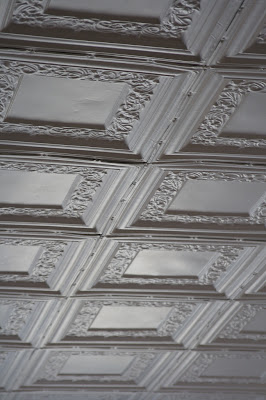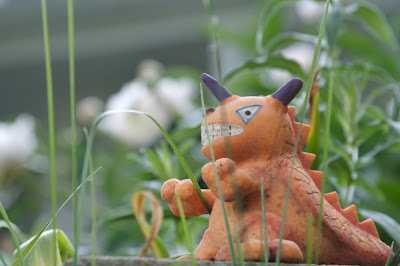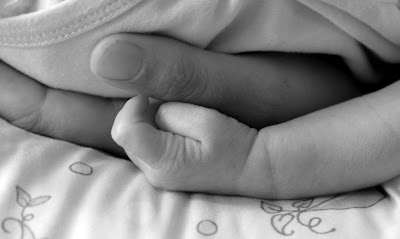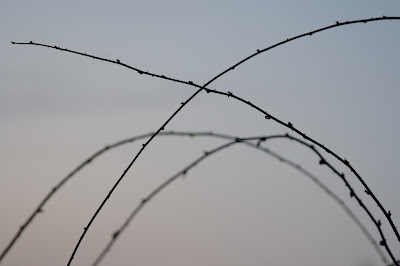
What better way to tell you about today than with a recipe? Only 3/5 of my family (counting the dog and me) will eat the end product. [Though my beautiful mother said to me on Sunday morning: you know, you could put a picture of the pie up, even though you've started eating it. So I know she likes looking at it, even if she doesn't like to eat it.] But oh is it worth the work.
Did I mention that I'm Back Home Again in Indiana, though not particularly because of tomorrow's race? We only eat the best snack foods here: homemade sangria, homemade guacamole, homemade key lime pie, and homemade...
Rhubarb Pie
crust: 2 1/2 cups flour, 1 tsp. sugar, 1 tsp. salt, 2 sticks butter, about 1/3 cup water
Mix together the dry ingredients in a large-ish bowl. Cut the butter into 1/4" thick pieces and break into dry mixture. Using a pastry blender (looks like this, if you don't own one already), cut the fat into the flour. Basically, what this means is that you should just keep pushing the pastry blender straight down into the bowl, using its little arms to cut the butter into smaller and smaller pieces and mix it with the dry ingredients. Eventually, the lumps will be mostly gone, but not all gone. When you get to that point, drizzle about 1/3 c. of water over this mixture and then toss it through the flour/butter mixture with your fingers. Don't knead the dough, and don't push it very hard. Just try to get the water worked all the way into the flour/butter mixture. If the dough starts to come together with only that much water, great. If not, add a little bit more water and toss it together some more. The dough doesn't have to be perfectly smooth at this point. But it should hang together when you split it into two evenly sized balls and wrap it in plastic wrap and put it in the fridge.
Then you can turn to your filling. If you're trying to save time, as I was doing today, you can mix the filling first, and by the time you're done putting the crust together, the oven will be warmed up and the filling will have sat for the proper amount of time.
filling: 2 lbs. rhubarb (try for the slimmest stalks--the ones about the size of your finger), 1 1/4 cups sugar, 4 tbsp. cornstarch, zest of one orange (zesters are wonderful tools; turns out I've been using mine upside-down all these years), tiny dash of salt
Cut the ends off of the rhubarb (and wash it). Cut the rhubarb into 1" chunks. Put them in a bowl and mix in all the other ingredients. Let stand for 15 minutes, stirring occasionally.
(See how easy that is? It's so easy that while you're doing it, you can be telling your companions stories about people they've met but haven't seen for awhile.)
Your oven should be preheating to 425 F while this is all going on.
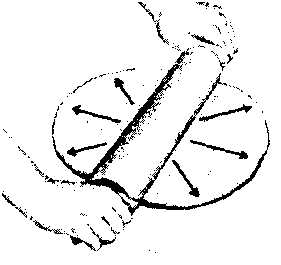 Rolling dough? It's not that hard. Make sure you have a large surface you can clean off and cover with flour. Flour your rolling pin. Shape the dough into a fat disk. Here's the fun part: each time you roll the pin over the dough going in one direction, be sure to roll it over the dough in the opposite direction, too. (Here's a diagram that shows you vaguely what I mean.) You don't need to be overly finicky about alternating directions, and sometimes the dough will seem to have a mind of its own. Just be sure you're rolling the dough evenly in all directions--rather than thinning it out in one way but leaving it thick in another.
Rolling dough? It's not that hard. Make sure you have a large surface you can clean off and cover with flour. Flour your rolling pin. Shape the dough into a fat disk. Here's the fun part: each time you roll the pin over the dough going in one direction, be sure to roll it over the dough in the opposite direction, too. (Here's a diagram that shows you vaguely what I mean.) You don't need to be overly finicky about alternating directions, and sometimes the dough will seem to have a mind of its own. Just be sure you're rolling the dough evenly in all directions--rather than thinning it out in one way but leaving it thick in another.
If something goes wrong, ball the dough up and try again. You can also repair tears in the dough: dab a little water on the dough and stick its torn self back together. Be patient and feel your way with the dough. This is one of the very good parts, even when it goes wrong.
Once you have a bottom crust rolled out, fold it in half and transfer it to a 9" pie dish, where you'll unfold it. Put the rhubarb filling into the bottom crust. Roll out the top crust. Using a pastry brush or your fingers, wet the top of the bottom crust so that you can seal the top crust to it. Now, it's a little hard to explain to someone in words how to finish a crust--and not just because there are so many ways one can choose to finish a crust off. For instance, you can trim both the top and bottom crusts pretty close to the pie pan and then crimp them with a fork. Or you can trim them but then put a fancy crust braid all along the edge of the pie. Or you can do what I do, which is basically to gather up all the dough that's inevitably hanging over the edge of a pie--and make a bit, fat, rolled-over-onto-itself crust. Whatever you do, it will be fine as long as you've remembered to wet the bottom crust with water and seal the top crust to it by pressing them together before starting your finishing work.
Lightly beat an egg white with a fork and brush it over the top of the pie. Sprinkle about 2 tsp. of sugar over the pie. Poke the pie with a fork to create steam vents.
Now, bake that pie for about 30 minutes at 425 F. Then, reduce the temperature to 350 F, and consider getting some foil or a baking sheet under that pie dish in case the pie decides to let loose. Bake the pie at 350 F for about 30 minutes.
And that's your pie. This one is mighty tasty with vanilla ice cream. It also makes a fabulous breakfast once it's a leftover, which my pie now is.
Source of tonight's pie-rolling diagram: Gramma's Pie Recipes. The Joy of Cooking has an even better one.
